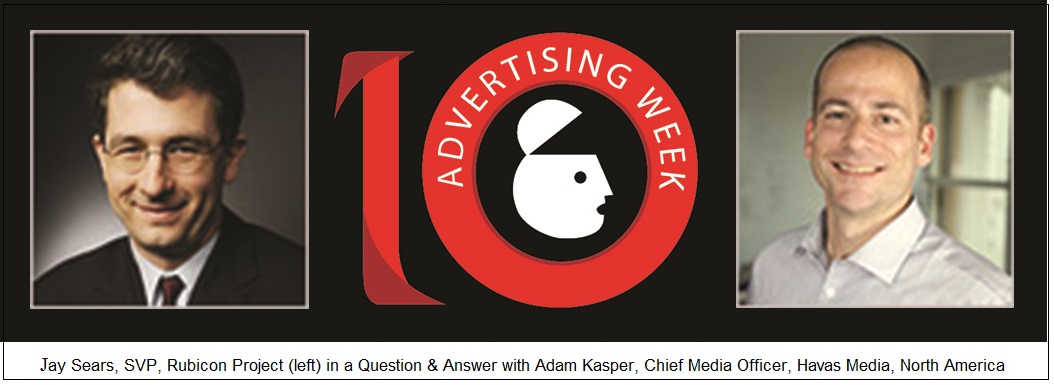Agency Trading Desks: Automating Direct Orders? Questions & Answers with Adam Kasper of Havas Media, North America - Jay Sears

This is the third of a five-part series run by Jay Sears of the Rubicon Project at MediaBizBloggers.com leading up to a live session with the global heads of the agency trading desks at the New York Times Center on Thursday, September 26, 2013 at 11am during Advertising Week in New York.
Today we feature Sears' third Q&A in the series, this one with Havas Media and their Affiperf trading desk (you can also read past Q&As with Paul Dolan of Xaxis and Michael Brunick of Magna Global ;
Your Name: Adam Kasper
Your Company: Havas Media
Your Title: Chief Media Officer
What Flavor Ice Cream Best Describes Your Management Style: Salted caramel with M&Ms, mostly because it sounds pretty good right now.
SEARS: On average—out of each $1.00 spent on media (all media, not just digital) by one of your advertisers, how much today is spent on automated or programmatic channels?
KASPER: Depends on the definition of programmatic. Does that include all ad networks and aggregators? If so, probably $.03-$.05
Adoption in digital is rapid. We are trending up 300% + in programmatic digital this year by consolidating buying and adding new channels such as mobile, video and social to the mix. Also seeing growth in programmatic for traditional channels such as audio, out of home and of course television.
What was this number two years ago, in 2011?
KASPER: <$.01
What will this number be two years from now, in 2015?
KASPER: $.15
SEARS: Describe how most media (all media, digital + non-digital, non-programmatic media) is bought and sold today.
KASPER: Most media, i.e. the big budget from TV, are bought in the same way they have always been, one to one negotiations. Planning however, has begun to evolve to a more automated state with use of multiple data sets and workflow tools to reduce the steps involved. Still, overall, the majority of dollars are being spent in a similar way to how they were being spent 10 years ago.
SEARS: Tell us the about Havas Media:
KASPER: Havas Media, in January 2013, rebranded globally and shuttered the MPG and Media Contacts brands. The move was more than a name change. It involved integrating 2 agencies that had existed next to each other, but separately for 12 years. Havas Media is now one, centrally managed full service media agency. We retain specialties in digital, data, search, mobile, tv, etc. but collectively work as one team. Havas has also put a strong emphasis on bringing media and creative together, housing both parts of the business in the same campus, called Havas Village. By the end of this year all Havas agencies in NY will be housed at 200 Hudson to promote integration.
PLEASE TELL US: [answer what you are able to answer.]
· Overall managed budget (media spend) for your trading desk, expected 2013 GLOBAL:
· Percentage increase, managed budget (media spend) 2012 vs. expected 2013:
· How many employees globally
o KASPER:Proprietary
SEARS: What are Havas Media North America's three biggest initiatives for the second half, 2013?
KASPER:
-Continue to build the trading desk
-Build a track record of success in the US market
-Bring creative and media together for the benefit of our clients
SEARS: By 2015, what percentage of total media spend across your holding company will be programmatic?
KASPER: 15%
We are rapidly moving client budgets across all channels into the programmatic space. This is not to say it is all going through our trading desk per se, but rather taking advantage of the efficiency and targeting advantages the programmatic buying offers us. Certainly our trading desk is capturing much of this spend but we are more focused on finding advantages for our clients through technology and helping to shape this space as it develops.
I firmly believe that the majority of media spend, in time, will be transacted through programmatic channels. The growth will be consistent but conservative until mass media inventory is available in a scalable fashion.
SEARS: To reach a higher adoption of direct deal automation and use of the programmatic channel, what are the major impediments to overcome? Rank these in numerical order:
KASPER:
_3_ Operational or workforce issues inside the holding companies or operating agencies
___ Premium (direct deal) inventory availability via programmatic
___ Lack of proper ad technology
___ Alignment of agency compensation models
1, 2_ Other: Publisher willingness and pricing
SEARS: How are RFPs used between your operating agency clients and your trading desk? What does a "Programmatic IO" or a "Programmatic RFP" look like?
KASPER:
-Client team sends an IO to the trading desk just like any vendor
-Depends - it ranges from a detailed data and inventory request to a basic demo. We are pushing our agency teams to provide more detail and direction in terms of data in RFPs. We are trying to foster relationships between 3rd party data providers and clients/media teams so the trading desk is presented with a more informed RFP.
SEARS: What should top comScore publisher CROs do to build their direct order automation and programmatic selling with your trading desk and operating agencies?
KASPER:
-Structure clear inventory tiers and pricing
-Integrate with multiple DSPs
SEARS: Why is direct deal automation so important? Is it important?
KASPER:
-Highly important. Clients want to know that they are not buying remnant. And I believe publishers should want to sell (price controlled) premium inventory through programmatic. Programmatic will only continue to grow if premium is central to the offering.
SEARS: All of you work for global companies. What global markets are the leaders and laggards in programmatic?
KASPER:
-US, UK, France and Israel are leaders. From what we have seen, most of the innovation is happening in the US. Israel is interesting as well as there is so much technology development and investment happening there. Being a Paris based company we are also privy to innovations coming from France which significant as well.
Tell Us a bit more about you:
SEARS: What's your favorite part of Advertising Week in New York?
KASPER: Tell you next week
SEARS: If you could travel for pleasure anywhere in the world, to a place you have never been, where would you go?
KASPER: Hawaii. I also want to go to SE Asia to countries like Vietnam and Thailand.
SEARS: If you were trapped alone on a desert island and needed to choose one ad holding company CEO to accompany you ( other than your own holding company CEO), which CEO would you pick and why?
KASPER: Martin Sorrell - such an industry icon.
SEARS: When is the last time you went out for a three martini lunch?
Today
Thanks!
For the fifth year at Advertising Week in New York, Jay Sears of the Rubicon Project will assemble the agency trading desk leaders from each of the largest holding companies in the world for their annual check-in on Thursday, September 26th at 11am on the main stage at The New York Times Center.
We'll speak with Michael Brunick (SVP, Programmatic, Magna Global, Interpublic); Paul Dolan (SVP, Global Business Development, Xaxis, WPP); Josh Jacobs (President, Accuen, Omnicom); Adam Kasper (Chief Media Officer, Havas Media North America (Affiperf), Havas) and Kurt Unkel (President, VivaKi (AOD), Publicis).

Jay Sears is GM, REVV Buyer for the Rubicon Project. Sears is responsible for global relations with the buy side including ad holding companies, ad agencies, agency trading desks and demand side platforms headquartered in North America. Jay can be reached at jsears@rubiconproject.com.
Check us out on Facebook at MediaBizBloggers.com
Follow our Twitter updates @MediaBizBlogger
The opinions and points of view expressed in this commentary are exclusively the views of the author and do not necessarily represent the views of MediaBizBloggers.com management or associated bloggers. MediaBizBloggers is an open thought leadership platform and readers may share their comments and opinions in response to all commentaries.


